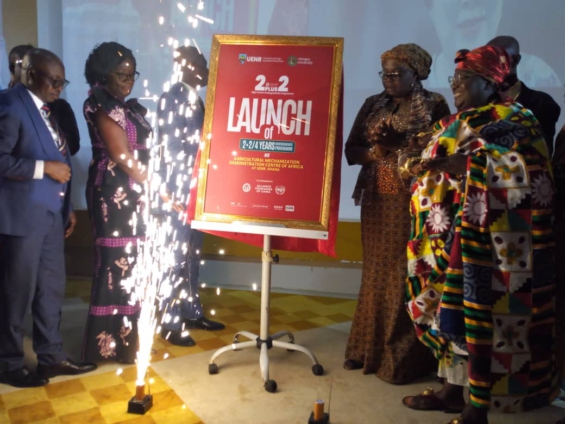The University of Energy and Natural Resources (UENR), Sunyani and the Jiangsu University (JSU), China have sealed a collaboration with the launch of a four -year Undergraduate Programme alongside with the establishment of African Agricultural Mechanisation Demonstration Centre Project.
Through the four-year Undergraduate Programme, the JSU intend to adopt some Senior High Schools (SHSs) in Ghana as affiliated high schools where students would be selected each year to further their education at the JSU, starting from bachelor level to Doctor of Philosophy (PhD).
Thus, students could either be enrolled directly at the JSU four-year academic programme where they would spend the first two years at the JSU partner universities in Ghana and proceed to JSU to complete the remaining two years for graduation and certification.
The African Agricultural Mechanisation Demonstration Centre too being hosted by the UENR is the first of its kind in Africa by a foreign university.
Co-sponsored by the JSU, UNIDO (United Nations Industrial Development Organisation), and Alliance Companies of China, the Project is aimed to assist students in learning and acquiring the necessary skills to promote agriculture mechanisation and support farmers to hire or affordably acquire agricultural tools, a variety of equipment and products.
Speaking at the launch in Sunyani, Professor Elvis Asare-Bediako, the Vice Chancellor of the UNER said the unveiling of the four-year undergraduate programme and the Centre, “ushered in an era brimming with boundless opportunities, unparalleled innovation and remarkable growth, both for the thriving lands of Africa and the continent’s strong relationship with the people of China.”
He said, “at the very core of UNER’s mission lies an unwavering dedication to excellence and a visionary pursuit to revolutionize education and research within the realms of energy and natural resources.”
Prof. Asare-Bediako described the partnership as an embodiment of the University’s resolute commitment to providing an all-encompassing educational pathway that equipped its students with the skills and fortitude needed to navigate the swiftly changing global landscape.
He said the four-year Undergraduate Programme stood as a beacon of opportunity for Ghanaian students, igniting an academic journey that transcended conventional boundaries to nurture their talents, expand their horizons and endow them with skills essential to excel in a myriad of fields, either engineering, technology, or medicine and beyond.
Prof. Asare-Bediako lauded the African Agricultural Mechanisation Demonstration Centre Project, saying it was, “a herald of paradigmatic transformation in our approach to agriculture a fundamental sector that lies at the very heart of Africa’s progress and well-being.”
The Centre he said served as “a testament to our unwavering dedication to revolutionizing agricultural practices through the fusion of cutting-edge technology, transformative education and international collaboration.”
Prof. Asare-Bediako noted that the Centre stood tall as a beacon of hope, empowering Ghanaian revered farmers, and other stakeholders within the intricate web of the food supply chain, arming them with the requisite tools, knowledge, and resources to surmount the ever-evolving challenges they faced.
He said harnessing the might of innovation and fostering a spirit of cooperation signified commencement of a journey towards a sustainable agricultural ecosystem that fortified food security, enhanced livelihoods, and propelled economic development across the entire African continent.
Highlighting on the four-year Undergraduate Programme, Prof. Daniel Nana Adu, the Director of Collaborations and Coordinator of the Belt and Road Initiative, African Sector, JSU explained that graduates under the programme could proceed to the master’s level through to PhD under various scholarship packages based on their performance.
The programme, he added would help the Ghanaian youth to acquire high-level engineering, technology and machinery skills and produced well-qualified trained farmers, medical personnel, computer experts and other skilled professionals for the development of the country.
Prof. Kwasi Nsiah-Gyabaah, the Chair, Governing Council of the University who presided said the event did not only marked a turning point in the academic journey of UENR students but also held immense importance for the Bono Region, Ghana, and the entire African continent.
He said it provided an opportunity for particularly the Ghanaian youth to equip themselves with necessary skills, knowledge and global perspectives empowering them to excel in diverse fields to contribute meaningfully to the progress of the society.
Latest Stories
-
Global Summit Series Africa 2025 unveils bold speaker lineup to drive ‘Africa on Purpose’
21 minutes -
Remote communities to benefit from $85m solar energy rollout – Jinapor
25 minutes -
2-month-old baby dies in fire incident at Madina
37 minutes -
Tinny returns with new Afropop song ‘Barrier’
39 minutes -
NSMQ 2025: T.I. AMASS Salaga knocks out regional favorites Damongo SHS to secure first national championship spot
40 minutes -
Invest with confidence: MiDA CEO champions ’24-Hour Economy’ as bankable and transparent
40 minutes -
Korea Week 2025: A celebration of culture, connection, and rise of fierce crew GH
45 minutes -
African Corporate Governance Network appoints first female CEO in its 12-year history
45 minutes -
Is Ghana’s tech sector growing well?
46 minutes -
Ghana to host first genocide memorial monument in Accra
59 minutes -
Ghana unveils ambitious renewable energy drive to boost green transition and economic growth
59 minutes -
Dismiss Basintale, Hannah Bissiw over Ablekuma North re-run violence – Minority to gov’t
1 hour -
Deloitte ranked number 1 consulting service provider for 8th consecutive year
1 hour -
UDS step up preparations for World University Games in September
1 hour -
GRNMA halts planned strike after productive talks with gov’t
1 hour

